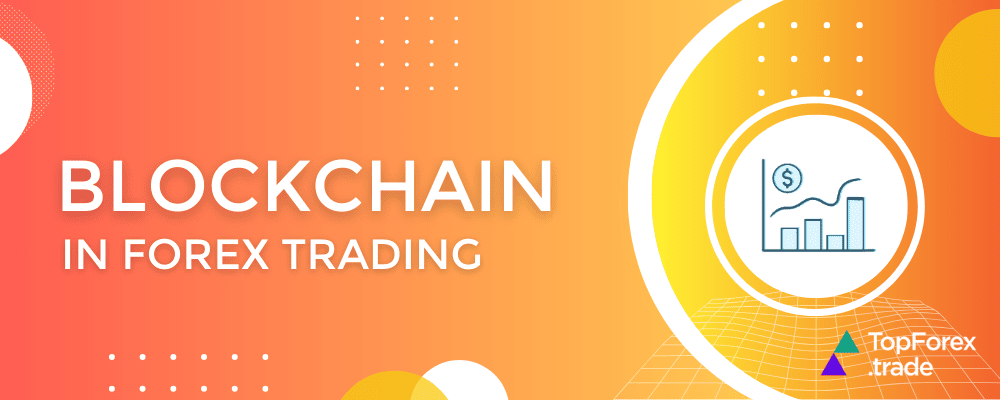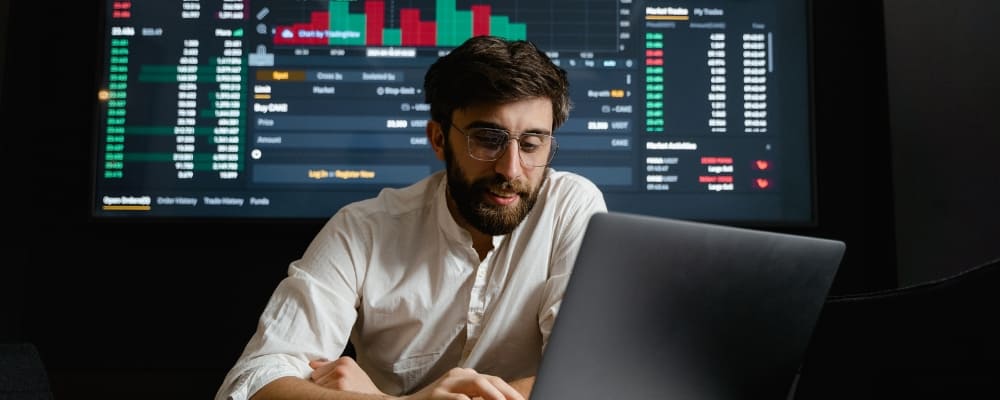Blockchain impact on Forex trading: top brokers for a modern trading experience

Blockchain technology is rapidly transforming various industries, including finance, with its decentralized, transparent, and secure ledger system. Initially developed to support cryptocurrencies like Bitcoin, blockchain has since expanded to applications such as smart contracts, supply chain management, and digital identity verification. These features make blockchain a powerful tool for revolutionizing traditional systems.
Similarly, the Forex trading market, one of the largest and most liquid financial markets globally, involves the daily exchange of over $6 trillion in currencies. Traditionally dominated by centralized institutions like banks, the market faces challenges such as high transaction costs, lack of transparency, and security vulnerabilities.
As blockchain technology gains momentum, its potential to disrupt and enhance the online trading market is becoming clearer. By introducing decentralized, transparent processes, blockchain could address many of the inefficiencies in traditional trading systems. This integration promises a more efficient, secure, and accessible market for traders worldwide. This article examines how blockchain could reshape the future of Forex trading, focusing on its potential benefits, challenges, and long-term impact.
Understanding blockchain technology

Unlike traditional systems that rely on a central authority (like a bank or government), blockchain operates on a peer-to-peer network. Each participant in the network (known as a node) has access to the entire blockchain and can verify the authenticity of transactions. This decentralization reduces the risk of single points of failure and makes the system more resilient against attacks.
Blockchain transactions are visible to all participants in the network, creating a transparent system where every action can be traced and verified. Once a transaction is recorded on the blockchain, it is time-stamped and linked to previous transactions, forming a chain of blocks. This visibility enhances trust among participants, as all parties have access to the same information.
One of the most critical features of blockchain is its immutability. Once a transaction is added to the blockchain, it cannot be altered or deleted. This permanence is ensured by cryptographic techniques that secure the data in each block. As a result, blockchain provides an unchangeable record of all transactions, making it highly reliable for maintaining accurate records.
Current applications of blockchain in various industries
Blockchain’s versatile and robust features have led to its adoption across a wide range of industries beyond just finance:
- Cryptocurrencies
The most well-known application of blockchain is in cryptocurrencies like Bitcoin and Ethereum, where it enables secure, decentralized transactions without the need for intermediaries.
- Supply chain management
Blockchain is increasingly used in supply chain management to track the movement of goods from production to delivery. Its transparency and immutability ensure that all participants can verify the authenticity and origin of products, reducing fraud and increasing efficiency.
- Smart contracts
Blockchain supports the creation of smart contracts, self-executing contracts with the terms of the agreement directly written into code. These contracts automatically execute when predefined conditions are met, reducing the need for intermediaries and ensuring timely execution.
- Voting systems
Blockchain is being explored for use in voting systems to create tamper-proof and transparent election processes. It ensures that votes are recorded accurately and cannot be altered, providing a reliable and secure method for conducting elections.
In the context of online trading, blockchain’s potential to enhance transparency, security, and efficiency could revolutionize the way currency trading is conducted, paving the way for a more decentralized and trustworthy financial market.
Blockchain to innovate Forex trading

As the global economy becomes increasingly interconnected and technology continues to advance, traders are demanding faster, more secure, and more transparent solutions.
Blockchain technology, with its decentralized, transparent, and secure nature, offers a promising solution to many of these issues. By enhancing transparency and ensuring faster and more secure transactions, blockchain could address the key pain points in the current FX market. As the industry looks to the future embracing these technological advancements will be crucial for staying competitive and meeting the evolving demands of traders worldwide.
Potential benefits of blockchain in Forex trading

Blockchain technology offers several key advantages that could revolutionize the FX trading market, addressing many of the existing challenges and improving the overall trading experience.
- Increased transparency
Blockchain’s decentralized ledger allows all participants in the network to view and verify every transaction in real time. This level of transparency ensures that all market participants have access to the same information, reducing the likelihood of fraud and manipulation. Traders can trust that the data they are seeing is accurate and unchanged, fostering a fairer trading environment.
- Improved security
Blockchain’s use of cryptographic algorithms ensures that once a transaction is recorded on the blockchain, it cannot be altered or tampered with. This immutability protects against fraud and hacking, making the Forex market more secure.
Recommended read: Forex brokers security measures: regulation, encryption, segregated accounts, and more
- Lower Costs
Blockchain technology can significantly reduce these costs by streamlining the transaction process and eliminating the need for intermediaries. With blockchain, traders can execute transactions directly with each other, lowering the fees associated with trading and increasing profitability.
- Faster settlements
With blockchain, transactions can be processed and settled within minutes, or even seconds, reducing the risks associated with price fluctuations during settlement delays and allowing traders to access their funds more quickly.
Blockchain-enabled innovations for currency transactions

Blockchain technology is not only enhancing existing currency trading processes but also paving the way for innovative solutions that could transform the market. Here are some of the key blockchain-enabled innovations that hold significant potential for the future of forex trading:
Smart contracts
Smart contracts are self-executing contracts with the terms of the agreement directly written into code. In forex trading, smart contracts can automate the execution of trades when predefined conditions are met, eliminating the need for intermediaries and reducing the risk of human error. For example, a smart contract could automatically execute a currency trade when the exchange rate reaches a certain threshold, ensuring that trades are conducted efficiently and securely. By automating these processes, smart contracts can also reduce transaction times and costs, making forex trading more streamlined and reliable.
Tokenization of currencies
Tokenization involves converting physical or digital assets into tokens on a blockchain. In forex trading, tokenizing currencies means representing fiat currencies as digital tokens on a blockchain, which can then be traded like Cryptocurrencies. This innovation could greatly simplify and speed up transactions, as tokenized currencies can be transferred instantly and without the need for traditional banking infrastructure.
Additionally, tokenization can facilitate the creation of new financial products, such as currency-backed stablecoins, which can be used for trading or as a hedge against market volatility. By bridging the gap between traditional fiat currencies and digital assets, tokenization could lead to a more integrated and efficient currency market.
Top of the most tech-advanced Forex brokers
Yet, while blockchain technology is gaining traction and could potentially be integrated into various aspects of financial services, including Forex trading, the adoption of blockchain by major Forex market players is still in its early stages.
As the market evolves with the integration of blockchain technology, choosing the right broker becomes crucial for maximizing the benefits of these innovations. Brokers mentioned below are both regulated and reputed, each of these brokers offers cutting-edge tools, robust security features, and efficient trading environments that align with the advancements that potentially will be brought by blockchain technology, making them ideal partners for both novice and experienced traders.
XTB: Advanced trading tools and transparency
XTB is known for its state-of-the-art trading platform that offers advanced charting tools, extensive market analysis, and a user-friendly interface. As blockchain increases transparency in forex trading, XTB’s platform complements this by providing real-time market data and comprehensive trade execution transparency. With XTB, traders can benefit from the security and clarity that blockchain technology offers, ensuring that they make informed decisions in a transparent trading environment.
NAGA: Social trading and decentralization
NAGA Markets is a pioneer in Social trading, allowing traders to follow and copy the trades of successful investors. The platform’s focus on decentralization aligns perfectly with blockchain’s potential to democratize forex trading. By enabling peer-to-peer transactions and reducing reliance on central authorities, NAGA’s model supports the broader move towards decentralized trading ecosystems. With NAGA, traders can engage in a more connected and inclusive forex market, leveraging the power of blockchain to enhance their trading strategies.
XM: Fast execution and lower costs
XM is renowned for its fast execution speeds and low-cost trading environment. As blockchain technology streamlines transaction processing and reduces fees, XM’s emphasis on speed and cost efficiency makes it a great fit for traders looking to capitalize on these benefits. By trading with XM, investors can enjoy faster settlements and lower transaction costs, which are key advantages of blockchain-enabled forex trading.
OANDA: Security and cross-border trading
OANDA has a strong reputation for security and reliability, making it a trusted choice for traders around the world. With blockchain’s ability to enhance security and facilitate cross-border transactions, OANDA’s robust platform ensures that traders can conduct forex transactions with confidence. The broker’s focus on secure and seamless trading experiences makes it well-suited for benefiting from blockchain’s potential to revolutionize cross-border payments and reduce the risks associated with international trading.
Exness: Accessibility and Innovation
Exness is known for its accessibility, offering a range of account types and tools that cater to traders at all levels. As blockchain technology enables greater access to forex markets, particularly in underbanked regions, Exness’s commitment to inclusivity and innovation makes it an excellent partner for traders looking to explore new opportunities. By choosing Exness, traders can tap into the expanding global forex market, supported by the efficiencies and inclusivity that blockchain technology brings.
In conclusion, while blockchain technology holds great promise for the future of forex trading, it’s important to choose a broker that already offers a reliable, advanced, and secure trading environment. XTB, NAGA, XM, OANDA, and Exness are all trusted names in the industry, known for their cutting-edge tools, transparency, and commitment to trader success. By trading with these brokers, you can take advantage of the best that the current market has to offer while staying prepared for future innovations. Start trading with confidence by opening an account with one of our partner brokers today through the links provided, and position yourself for possible success in the dynamic world of online trading.
Related articles:
Blockchain in Forex trading - FAQ